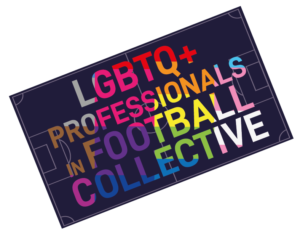LGBTQ+ Professionals in football collective
Who are we
The LGBTQ+ Professionals in Football Collective has been built by a working group of people from across the game who are in professional or semi-pro roles, such as players, coaches, match officials, executives, and ED&I experts.
One of the Collective's objectives is to create more visibility and show the representation that exists within different areas of the game, thereby letting other LGBTQ+ people in football know that advice, support, and networking opportunities are available to them just by connecting.
We asked some of our core members to introduce themselves and give an insight into their individual experiences.
Read their bios and mini Q&As below - to reach out, email us or sign up to our mailing list
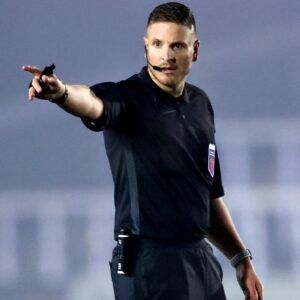 Ryan Atkin is a National League, Barclays FAWSL and EFL match official.
Ryan Atkin is a National League, Barclays FAWSL and EFL match official.
In August 2017, he was the first-ever referee in professional football to come out. He is a campaigner for visibility and can often be seen in the media using his voice for change in the game. He is also a senior manager within the rail industry and a Stonewall and Athlete Ally Ambassador.
What made you want to be a part of the Collective?
This kind of group is something I aspired to be a part of when I came out in 2017, but representation in the professional game was more limited at the time. Having worked collaboratively with many in this group individually within their different fields and professions, the coming together of all to create this wonderful collective is truly inspiring and it will be a game changer within football.
Why would you recommend joining the Collective?
Football belongs to everybody! It's the people in football that make it so special. It's a space to collaborate, support and collectively campaign and drive for change in football. Only as one collective voice, will we see the real and impactful change that we all want.
What have been the benefits for you of being your authentic self in football?
I can now live my life as a gay man openly with my peers, and not having to lie, hide in the shadows, or look over my shoulder. It's given me a platform to help others and demonstrate the weight that has now lifted for me just by being my authentic self. It's been such an awesome journey for me personally, allowing for so many opportunities in and out of football. I've seen a huge improvement in my mental health within the game and my performance.
What changes are you seeing in the football industry that are making it more inclusive?
In its early concept, we had Stonewall's Rainbow Laces really highlighting the prevalence of homophobia within football. Although progress may seem slow, since the start of that campaign in 2013, we've seen a huge increase in LGBTQ+ fan groups and initiatives from the professional game. Players and fans truly are progressing the game to the next level. We cannot underestimate the power of a rainbow flag or that of allyship. More recently, we're seeing a domino effect of individuals coming out publicly across the game which only strengthens the work being done. However, we should never rest on our laurels as we see that across the world, anti-LGBTQ+ laws linger and in many places, equality is being eroded.
How has connecting with other LGBTQ+ people in football helped you personally and professionally?
We share a common interest in the beautiful game, and through knowing people who share similarities with myself, that's a conduit for game-changing initiatives. We're a collective that can represent the wider community within the sport at professional and semi-pro levels.
Who are the LGBTQ+ people in football who inspire you and why?
I think that for many years, I ignored those that came out before me because I'd chosen to hide my sexuality and distance myself from it all. However, on reflection, I look back at the trailblazers of their time, and think that if people are struggling with their sexuality now in 2022 in sport, what must it have been like for those pioneers? They are very courageous individuals, to whom I'm eternally grateful.
If someone working in football who's LGBTQ+ or an active ally asked you about this network, why would you recommend they join?
Some of the best minds and people have been involved in the early concept of this Collective. We all share the passionate belief that football loves them - whoever they are - and that they can love football as who they want to be.
Follow Ryan on Twitter and Instagram, and read more from him on the Collective on Sports Media LGBT+.
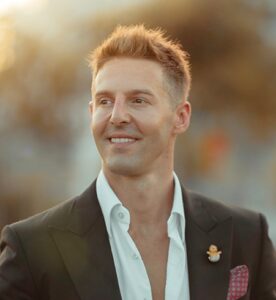 Thomas Beattie is a former professional footballer turned serial entrepreneur, venture capitalist and advocate.
Thomas Beattie is a former professional footballer turned serial entrepreneur, venture capitalist and advocate.
What have been the benefits for you of being your authentic self in football?
I’ve been able to use my platform and visibility to affect change within sport from all levels. Being able to mentor players, in an area that I struggled with, has given me an added sense of purpose.
What changes are you seeing in the football industry that are making it more inclusive?
More clubs are starting to embed EDI into the company structure. Having an organisation that from the top supports inclusivity within the back office and c-suite (senior leadership) will eventually bleed down into the company culture, so seeing more clubs adopt these roles is great - and it's long overdue.
Why are cross-industry network groups valuable?
Being able to leverage others people's network to benefit the common goals of the community are vital. Being able to change perceptions and create solid allies in other industries will help for better understanding and acceptance.
How has connecting with other LGBTQ+ people in football helped you personally and professionally?
It’s given me access to a group of people I didn’t know existed! Whilst playing I often felt alone, so being able to connect and help others from the community has not only given me purpose, but exposed me to other people's journeys. It’s become my chosen family which I’m very content with.
Who are the LGBTQ+ people in football who inspire you and why?
I was fortunate to have played a role in helping Josh Cavallo come out, so he has become like a little brother to me. His courage at such a young age is inspiring to me. Jake Daniels also, since I know how difficult this can be surrounded by the people who know you in a certain way. There are so many trailblazers in the back office and media of football that inspire me currently. Hugo, Jon, Josh Dixon and many more. Pernille Harder is also someone who I have a lot of admiration for!
What made you want to be a part of the Collective?
Being able to find comfort amongst a group of people who have a similar purpose to myself has been great! Being able to add value via my lived experience is also something I wanted to contribute.
If someone working in football who's LGBTQ+ or an active ally asked you about this network, why would you recommend they join?
Of course, support is vital for individual acceptance and our own unique journey. As well, every time the community grows, we get extra added value from someone who has seen the world through a different pair of eyes.
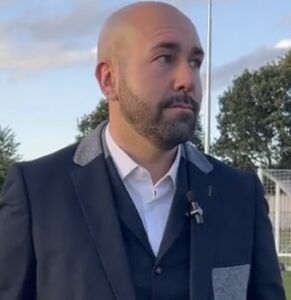 Cristian Colás is a UEFA Pro Licence coach who was previously the manager of Biggleswade United FC. He has built up a wealth of experience in two decades of coaching across Europe.
Cristian Colás is a UEFA Pro Licence coach who was previously the manager of Biggleswade United FC. He has built up a wealth of experience in two decades of coaching across Europe.
What have been the benefits for you of being your authentic self in football?
To live the game without hiding behind any excuse. To be able to link my passion for the game with the authentic ME.
Why are cross-industry network groups valuable?
They give you the opportunity to meet people like you and listen to each of their different experiences. These could be quite useful to yourself or to anyone who relates, at some point.
How has connecting with other LGBTQ+ people in football helped you personally and professionally?
It was a massive point in my career, when I decided to let everyone know the authentic me. Thanks to other LGBTQ+ people connected with the game, who helped by listening to me, giving me advice and their opinion, or just simply being there at any time I could have needed them.
Follow Cristian on Twitter.
 Mikey Connor is a referee officiating in leagues affiliated to the Liverpool County FA. A former semi-professional footballer, he appeared on TV in 2023 on the BBC dating show 'I Kissed A Boy'.
Mikey Connor is a referee officiating in leagues affiliated to the Liverpool County FA. A former semi-professional footballer, he appeared on TV in 2023 on the BBC dating show 'I Kissed A Boy'.
What have been the benefits for you of being your authentic self in football?
If you don't feel free within yourself, you're not going to enjoy the experience.
When I go out on the pitch, I'm just myself. I feel quite lucky in that I've never really suffered from any kind of homophobic abuse, whether playing, refereeing or just in normal life.
I love football and being involved with a league that's very inclusive and well run [the Liverpool Old Boys Amateur Football League], it means you can relax and it makes everything better.
What changes are you seeing in the football industry that are making it more inclusive?
Just talking has been the main change, I think. Being gay in football isn't seen as being as much of a taboo any more.
Homophobic language is still happening though. Refereeing in a Sunday league, things can get volatile and emotions will run high. You've got to manage the game.
But overall, these leagues are developing and there is more awareness now. So you can see that change is happening at the grassroots level too.
How has connecting with other LGBTQ+ people helped you personally and professionally?
We have some great role models in the game now - people like Zander Murray, Lloyd Wilson, Jake Williamson, to name a few. They're all very relatable and it's helpful to know that we've gone through similar experiences. I see what they're doing in terms of campaigning and expressing themselves and it inspires me too.
Now I'm getting to know them more, and picking up bits of advice, such as how to conduct yourself if you did find yourself in a situation where homophobic abuse was being directed at you.
It's hard to put into words but so many people within the Collective have found a level of comfort in who they are. You can take a lot from that.
Who are the LGBTQ+ people in football who inspire you?
Robbie Rogers was an important person for me when I was growing up and playing football. I would have been about 18 when he came out publicly in 2013.
I read his autobiography when it came out the following year and just seeing where his career took him and what he was doing for the community, it was empowering.
It reassured me that I shouldn't care about what other people think. I am who I am, and football's always going be my sport. If a few people didn't like me because I'm gay, then that would be their loss, not mine.
If someone working in football who’s LGBTQ+ or an active ally asked you about this network, why would you recommend they join?
When you're struggling with feelings, it's easy to feel like you've got no one to turn to, when in actual fact there is a support network around you and a lot of people who are ready to help.
You can get lost in your own mind but when that weight is lifted off your shoulders, you realise you didn't need to put yourself under all that pressure.
The Collective is all about providing those connections. There's a lot of knowledge there, beyond just football.
Since going on the TV show, I feel I've learned a lot more about the community that I didn't know. I wouldn't have registered it in the past.
Now there’s so much more that I do acknowledge. Getting involved with a football group like this, talking and engaging... it's a vital support network for our community in the game.
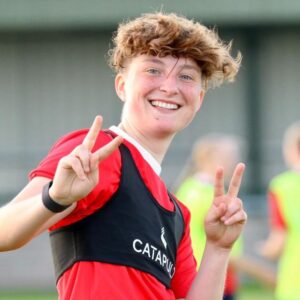 Parker Dunn is a footballer, primarily a defender, who has played for London Bees FC and other clubs.
Parker Dunn is a footballer, primarily a defender, who has played for London Bees FC and other clubs.
He is openly transgender, having coming out in June 2021. Parker shares his experiences and journey on TikTok where his posts have a watch rate of 3.5m a month, spreading inclusivity, knowledge, and positivity in a fun and creative way.
What have been the benefits for you of being your authentic self in football?
I've found a rapid growth in both my confidence and my performance. Coming out has enabled me to play with a settled mind - it's a huge weight lifted and a relief, especially when you have a supportive team/coach and manager. I feel free. I've felt an improvement in my mental health and my ADHD has improved. It's allowed me to focus on the sport that for so long I wasn't able to love and to be the best I can be.
How has connecting with other LGBTQ+ people in football helped you personally and professionally?
It's enabled me to feel included and not isolated. I think having those people who you can talk to makes you feel like you're not in it alone, particularly if you have struggles and you know they can relate and can offer you that support without judgment and with safety. Hearing their experiences also allows you to see a different aspect of the game and its inclusivity. I see it from the trans and gay perspectives... but it's good to see what others face too, such as people in football who are lesbian or bi.
What made you want to be a part of the Collective?
In this first year since I came out, at times I struggled immensely. I didn't know which way to go or who to turn to. As far as I was aware, I was the only trans footballer playing in the elite levels of the women's game. Coming out and navigating your way through this game while being different is tough and it can be scary. So having someone who has been there and done it, and seeing that they've been able to achieve their goals, is important. I didn't have that and therefore I feel a need to create that visibility for others.
If someone working in football who's LGBTQ+ or an active ally asked you about this network, why would you recommend they join?
I'd recommend joining the Collective if you're LGBTQ+ and pro or semi-pro in the game because it's important that we show the diversity in this sport. By being open and authentic, we allow others to do that as well. Imagine someone giving up the sport they love because they're LGBTQ+. You could be that difference between them staying in the sport, or joining the sport to better themselves and their health, or dropping out completely. You can make a difference just by being you.
Follow Parker on TikTok, Instagram and YouTube, and check out his in-depth Q&A on Sports Media LGBT+.
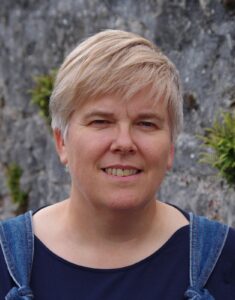 Lou Englefield is a founding Director of Pride Sports, a UK LGBTIQ+ sports development and inclusion organisation.
Lou Englefield is a founding Director of Pride Sports, a UK LGBTIQ+ sports development and inclusion organisation.
She has been a leading voice on LGBTIQ+ inclusion in sport and physical activity for more than 15 years. She directs the international Football v Homophobia campaign, is Chair of the FARE Network and is Co-Chair of Pride House International.
Lou presents and speaks on issues of LGBTIQ+ inclusion in sport and physical activity globally and has ensured that Pride Sports has become a leading authority on LGBTIQ+ inclusion in sport and physical activity, at the forefront of insight, policy and practice.
Why are cross-industry network groups valuable?
Industry networks not only provide much-needed visibility, but also a collective and authentic voice within sport. They have the potential to raise sport-specific issues around LGBTQ+ access, representation and progression and bring unique insight to address any continuing discrimination and bias.
Who are the LGBTQ+ people in football who inspire you and why?
One of my biggest inspirations is my colleague Natalie, Campaign Lead for Football v Transphobia. I admire the way she has spoken out about trans inclusion in sport at a time when we are seeing significant anti-trans activism in the UK. Natalie has taken on multiple media requests, appearing regularly on television, and putting across the case for inclusion calmly and eloquently, often in the face of significant opposition. I’m also inspired by Jake Daniels’ coming out in the media. It feels as if real change is happening now a 17-year-old male professional footballer has come out and taken control of his own narrative.
What made you want to be a part of the Collective?
My belief in the power of collective working and the importance of myriad voices in bringing about real and relevant change across football.
Follow Lou on Twitter.
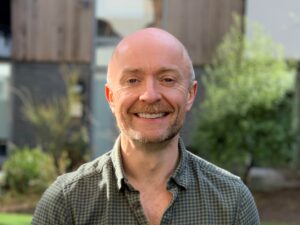 Chris Gibbons is Director of Inside Inclusion and has over 15 years’ experience working in the fields of diversity, equity, inclusion and anti-discrimination.
Chris Gibbons is Director of Inside Inclusion and has over 15 years’ experience working in the fields of diversity, equity, inclusion and anti-discrimination.
While his clients represent a range of sectors in the UK and globally, much of his experience comes from the sport industry and, in particular, grassroots and professional football.
Chris works with businesses of all sizes to explore and address issues relating to all forms of diversity and discrimination. He has significant expertise in the fields of disability, faith, gender identity and sexual orientation.
What changes are you seeing in the football industry that are making it more inclusive?
Since I started working in football nearly a decade ago, I have seen the game grow in confidence to talk about sexual orientation and gender identity, as well as homophobia, biphobia and transphobia, on a level playing field with other identities and forms of discrimination. From the grassroots to the top flights of the football and from clubs to county FAs, leagues and the authorities - the game is starting not just to acknowledge but celebrate the participation of LGBTQ+ people in football, on and off the pitch as well as put measures in place to address homophobia, biphobia and transphobia.
What made you want to be a part of the Collective?
Lived experience should inform inclusion. The Collective is an invaluable network of people working across the sport to share their experiences - whether positive or negative - and think about how we can all work together to create a game that is truly inclusive of LGBTQ+ people.
If someone working in football who's LGBTQ+ or an active ally asked you about this network, why would you recommend they join?
Because everyone has a role to play in making everyone feel welcome, safe, valued and included in football, whatever their sexual orientation or gender identity.
Follow Chris on Twitter.
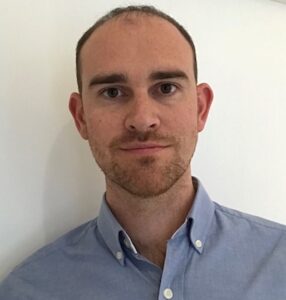 Jon Holmes is a media consultant and journalist specialising in content related to ED&I in sport.
Jon Holmes is a media consultant and journalist specialising in content related to ED&I in sport.
He has worked with many LGBTQ+ people and active allies in football, providing connections, advice and assistance for those who want to share their stories of authenticity.
He is the founder and lead of Sports Media LGBT+, an industry network, advocacy and consultancy group that helps to amplify under-represented voices, providing a valuable digital platform and community space.
He also leads on media and comms for Football v Homophobia and writes for Outsports.
What changes are you seeing in the football industry that are making it more inclusive?
I’ve worked in football media for over 20 years and from my standpoint, the change has been immense - so many clubs and organisations produce content throughout the year that reflects constructive conversations about inclusion in the game. However, there will still be lots of LGBTQ+ people and potential allies with roles in football that are either worried about reaching out to discuss, or who the various campaigns and initiatives haven’t yet reached on a personal level. This new network is going to contribute towards that change.
Why are cross-industry network groups valuable?
I moved to London to work in 2014 and quickly joined my then employer’s company LGBTQ+ and allies network group. Working in sport, I’d barely known anyone else who was gay like me. Suddenly I had colleagues and contacts from across the community, many of whom have gone on to become firm friends - this empowered me and helped build my self-confidence in a way that was also tremendously rewarding for my career. Since then, I’ve been part of a brilliant cross-industry network group called InterMedia UK and I’ve founded my own, Sports Media LGBT+. We offer reach other contacts, advice, support where needed, work opportunities and much more.
Who are the LGBTQ+ people in football who inspire you and why?
Robbie Rogers, who came out publicly in 2013, was a catalyst for me. I’m not a good player at all but living in Leeds at the time, I identified so strongly with his journey - I would say his book ‘Coming Out To Play’ is essential reading for anyone with a role linked to men’s football who’s struggling or has struggled with their sexuality. In terms of sports media, Alex Kay-Jelski (now editor of The Athletic) remains an important role model - I remember an interview he gave to the GFSN website back in 2012 and I think I’m right in saying he was the only person providing representation for gay or bi men in the entire industry. A decade later, he’s part of the Collective too and is a true trailblazer.
If someone working in football who's LGBTQ+ or an active ally asked you about our network, why would you recommend they join?
I know that for some, the act of just making contact - even anonymously - with a network like this will be an enormous step to take, regardless of their role in the game. For those of us who are LGBTQ+, it’s a part of who we are that’s so personal and many people don’t feel able to share their truth with anyone. Carrying that alone becomes a heavy burden and it’s vital for our mental wellbeing that each of us does find a way to lift the weight off our shoulders. Everyone in this Collective has been there so immediately there’s a connection that’s rooted in trust and confidentiality. Meanwhile, for those reading this who are already out or who are allies, there are massive benefits in terms of adding to your contacts, finding ways to use your voice to help others (which is so rewarding), and just being part of something bigger than yourself. It all comes down to teamwork and this is a great team to be part of.
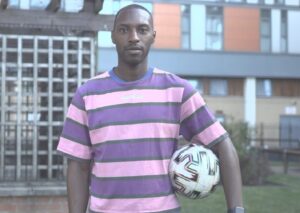 Jahmal Howlett-Mundle is a current semi-professional and former professional footballer. He has played football mainly across the South of England, as well as playing professionally during his time in Edinburgh.
Jahmal Howlett-Mundle is a current semi-professional and former professional footballer. He has played football mainly across the South of England, as well as playing professionally during his time in Edinburgh.
Now a workshop facilitator, he also has a background in teaching primary school PE. He is helping to mould the next generation by instilling in them positive core values. In July 2023, he signed for Sevenoaks Town FC.
What have been the benefits for you of being your authentic self in football?
By working towards becoming my authentic self in football, I have found that I play with my mind at ease. This is something I struggled with on a day-to-day basis until I came out to my team-mates in July 2021. Since that point, I have gone from strength to strength, winning the league title and three cup competitions during that season.
What changes are you seeing in the football industry that are making it more inclusive?
The visibility of LGBTQ+ people in a wide variety of roles has become more prominent in recent years. The amount of campaigns and initiatives that are set up within the community and by allies are promising, in the hope that more people will understand that we are human beings that love the game of football.
How has connecting with other LGBTQ+ people in football helped you personally and professionally?
It has put my mind at ease massively. Before coming out, I was very scared to be open about my sexuality and now that it has been almost a year, following many conversations with other LGBTQ+ people in football, it has helped my confidence in a range of environments. I have made some solid friendships since coming out, people who I look to for advice and comfort, and I am in a position now where I am able to offer the same to them.
What made you want to be a part of the Collective?
We aim to do our part as a team to share ideas and ways in which we can help to make football a much more inclusive space. Through our own journeys getting to this point, we have many shared experiences in being LGBTQ+ in football, and if we are able to help not only each other, but the wider society to understand some of the things we have been through and continue to spread positive messages and educate people, we will continue making steps in the right direction.
Follow Jahmal on Twitter and Instagram, and read more from him in this in-depth Q&A on Sports Media LGBT+.
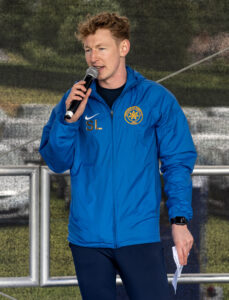 Sam Lansdale is a former Director and Trustee of Sevenoaks Town FC, where he oversaw the junior and youth teams at the club.
Sam Lansdale is a former Director and Trustee of Sevenoaks Town FC, where he oversaw the junior and youth teams at the club.
He has been coaching young people for over 10 years. In his work life, Sam has been Managing Director of Spartan Race UK & Ireland and Head of International Expansion of an EdTech business. Sam is passionate about educating the next generation of young people so that they grow up in a more accepting, diverse and compassionate world.
What have been the benefits for you of being your authentic self in football?
When I came out, I wasn't sure if I wanted to be out at football as well, due to the abuse and discrimination I thought I'd receive. However, upon reflection, I concluded that I wanted to be my authentic self at football. I think being my authentic self has enabled me to feel free while I coach - free of the fear of being 'found out' and like a weight has been lifted from my shoulders. I also think it's made me more relatable to young people and their parents/guardians, as they see me as having vulnerability just like they do. Finally, it's given me a greater understanding of the need for compassion in coaching which I only think enhances my ability to work with young people.
What changes are you seeing in the football industry that are making it more inclusive?
Honestly, I feel the rate of change in the professional game is worryingly slow. A large contingent still stand in the terraces and hurl abuse at players and referees - not homophobic abuse necessarily, but it just brings out that tribal mentality. So I can't say that I'm that optimistic about the professional game, especially with a number of high-profile players moving to the Saudi League. This is despite the efforts of great organisations like Kick It Out. At grassroots level, I think we have a greater potential for systemic change but I don't think there are yet the resources or expertise to deliver this. I'd like to see more education on ED&I being cascaded down to grassroots coaches so that they know how to address certain topics with different age groups - after all, football can be a great vehicle for change.
How has connecting with other LGBTQ+ people in football helped you personally and professionally?
I think connecting with other LGBTQ+ people in football has helped me feel less isolated as it can sometimes feel like a lonely world otherwise. I've made connections on both a friendship and professional level and this has given me more confidence. It's also filled me with a sense of optimism that things can change for the better with enough focus and energy. At future meetings, I'd like to explore charitable or volunteering opportunities in order to play my part more.
Follow Sam on Twitter.
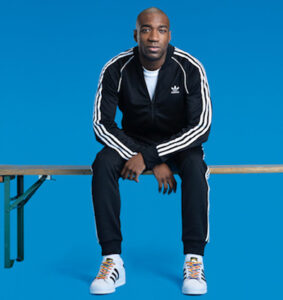 Jay Lemonius is Academy Support Manager at the Premier League. He has previously held roles at The FA and Brentford FC, as well as the charity Stonewall UK, where he was the Sports Campaigns Manager, managing the Rainbow Laces campaign.
Jay Lemonius is Academy Support Manager at the Premier League. He has previously held roles at The FA and Brentford FC, as well as the charity Stonewall UK, where he was the Sports Campaigns Manager, managing the Rainbow Laces campaign.
Jay is also a player and captain of Stonewall FC, the world's most successful LGBT+ football club, and plays for Millwall Romans FC.
What have been the benefits for you of being your authentic self in football?
For me, football has always been my safe space and a place that I always felt free and able to express myself via some form of outlet. When you get to a stage in your life where you begin to question whether this is actually a safe space and whether you actually belong, that can be pretty devastating. That journey of not only finding yourself but also reconciling elements of your identity that you once thought didn’t belong, is so incredibly empowering. Being able to be myself in a space which has already given me so much, has allowed me to find happiness in moments of darkness, whilst also providing confidence, a home and community in what can sometimes feel like a world that doesn’t accept LGBT+ people or black people for that matter.
What changes are you seeing in the football industry that are making it more inclusive?
I think one of the biggest changes has been consensus and also visibility (albeit in places where some mainstream media outlets seek to not find it). The fact that we have so many LGBT+ fan groups, LGBT+ football clubs and the many LGBT+ people who have been out, proud and visible, this has made a huge contribution to the conversation around LGBT+ inclusion in football. It is now not a conversation about whether we belong - we do, we have, and we will continue to be a part of the make up of the game. But the conversation has shifted more towards learning about their experiences and putting the onus back onto those in power and those allies who have a voice, to actually use that voice and action to advocate for change.
Why are cross-industry network groups valuable?
I can think of so many reasons why network groups are hugely important, but one of the huge ones for me is collective power. Support systems are vital, particularly for groups who can experience daily discrimination. We aren’t anywhere near where we would like to be with regards to visibility for LGBT+ people in football, so creating a space where we can have a collective voice to share our experiences, not just with each other, but to the world. There is great power in that and our ability to influence and provide the broad and diverse story of those experiences, with our own voices, can have a huge impact on inciting positive action and empowering others.
How has connecting with other LGBTQ+ people in football helped you personally and professionally?
For me, one of the reasons why I felt so confident that football professionally was something I wanted to pursue a career in, was because of some of the amazing people that I met along the way. Passionate campaigners, educators, LGBT+ leaders who had been working in football for a long time and have seen and experienced first hand how far we have come. Those are the people who inspire me and the people who, whether they realise it or not, gave me the confidence to attack every role I have had in the game. I think a lot is made of role models, but for a unique environment like football, sometimes there is nothing better than a role model who has first-hand experience of some of the hurdles you have had to overcome personally.
What made you want to be a part of the Collective?
A lot of the time our stories are told without us and a lot of the time it’s not through malice, but clumsiness. I think our experiences and our stories should be told by us. I have mentioned this a lot but there are some amazing LGBT+ people in the game who have done some incredible stuff for such a long time, having the opportunity to create with those individuals, something that can continue to add value not just to the game, but to other LGBT+ people whether in football or not, to me, is a powerful thing.
If someone working in football who's LGBTQ+ or an active ally asked you about this network, why would you recommend they join?
It’s an amazing opportunity to continue to be a part of some of the positive change that is happening within the game. Our existence can sometimes feel like an act of resistance in this space and there is such power in each of our individual stories, but it’s our collective voice, knowledge and experiences which is what can continue to make a huge difference to the game.
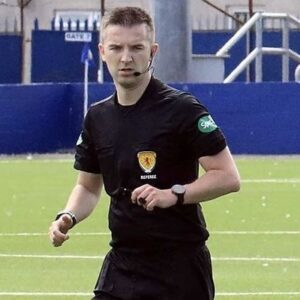 Dan McFarlane is a category 1 referee in Scotland, officiating in the Scottish Professional Football League (SPFL). Since qualifying in 2010 at the age of 16, he has progressed his refereeing career whilst discovering and accepting his sexuality.
Dan McFarlane is a category 1 referee in Scotland, officiating in the Scottish Professional Football League (SPFL). Since qualifying in 2010 at the age of 16, he has progressed his refereeing career whilst discovering and accepting his sexuality.
He was promoted to Category 1 in summer 2021. He strives to be a supportive person within the LGBTQ+ community, looking out for those who need to talk to someone.
What have been the benefits for you of being your authentic self in football?
I've never really hidden my sexuality within my footballing network. I have been openly gay since around 2014. There was always that feeling of “what are people thinking?”, but all my refereeing colleagues were very supportive and treated me as if nothing was different. I couldn’t have asked for any more than that and that's meant football for me has been a safe space for me to escape all the other hassles of daily life. Without doubt, this has helped me progress to where I am today.
What changes are you seeing in the football industry that are making it more inclusive?
There are some superb campaigns I have learned about, such as Rainbow Laces and Football v Homophobia. All of the people behind these campaigns are putting in a lot of hard work to strive for a more inclusive society within football. For anyone who feels they cannot be themselves within football, there's a lot of support within these campaigns to help.
How has connecting with other LGBTQ+ people in football helped you personally and professionally?
What has been amazing about connecting with the LGBTQ+ community in football, is that we all share the same vision and end goal, but we all have very different routes, paths and contributions to getting there. There are some who want to be at the forefront, and there are others who want to work more behind the scenes and contribute that way. I've learned a lot from these different approaches. I have now connected with some fantastic individuals who can provide any advice or support at the drop of a hat.
What made you want to be a part of the Collective?
As soon as I read about the Collective, I reached out to the team and shared my story. Jon explained about the aim of the Collective and he said if I felt that I could contribute in any way to support other LGBTQ+ people within football, then I would be welcome to join. It's been an excellent experience so far and I look forward to the future and the positive impact the Collective will make within the game.
Follow Dan on Instagram.
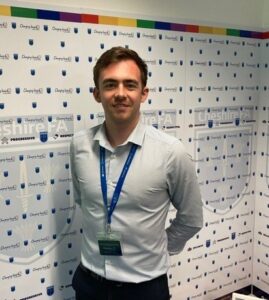 Greg McLean is a keen member of the grassroots football community across Liverpool and Cheshire. He is Business Development Manager at Cheshire FA in addition to his roles as Secretary of the Liverpool Old Boys Amateur Football League and St Margaret’s Old Boys Football Club.
Greg McLean is a keen member of the grassroots football community across Liverpool and Cheshire. He is Business Development Manager at Cheshire FA in addition to his roles as Secretary of the Liverpool Old Boys Amateur Football League and St Margaret’s Old Boys Football Club.
What have been the benefits for you of being your authentic self in football?
There is a fear before we 'come out' about how people are going to respond or whether their opinion of you is going to change in some way. Now that I am in the position of being my true authentic self within the game, it has been a huge weight lifted.
It also gives me the opportunity to provide support to those who may be going through a similar journey; and to educate those who aren’t about the impact of their support and allyship, or lack of!
What made you want to be a part of the Collective?
I think it is important to provide a safe space where like-minded individuals can express themselves with authenticity. Being a part of the Collective is something that I hadn’t thought was possible a number of years back when I was ashamed of my sexuality.
It is important to work together as a community to educate those within the game of our experiences and to provide support to fellow members of the LGBTQ+ community who suffer discrimination.
If someone working in football who's LGBTQ+ or an active ally asked you about this network, why would you recommend they join?
Come and join the network – it is hugely important that we continue to grow and incorporate both members of the LGBTQ+ community and active allies.
Everyone’s voice, thoughts and opinions are integral into us continuing to make football a game for all.
It is a long journey that we are on, and a lot of work has to be done around education both within the game and within society, but the more allies we have as a community, the better chance we have of succeeding in our mission.
Follow Greg on Twitter.
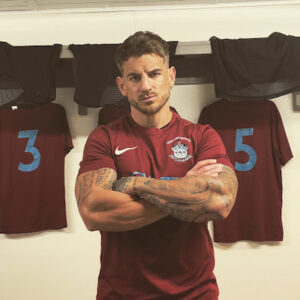 In addition to being player-manager at Eastern Counties Football League Premier Division club Thetford Town FC, Matt Morton is also a successful entrepreneur from the world of health, fitness and sport. He has held various senior positions across those industries since his early 20s, specialising in leadership, strategy and commercial.
In addition to being player-manager at Eastern Counties Football League Premier Division club Thetford Town FC, Matt Morton is also a successful entrepreneur from the world of health, fitness and sport. He has held various senior positions across those industries since his early 20s, specialising in leadership, strategy and commercial.
What have been the benefits for you of being your authentic self in football?
Being my authentic self in football has given me a platform to be able to help others feel comfortable and confident to do the same. Coming out as gay in the game has provided representation for others and in many cases given those people the confidence to reach out to me for support.
What changes are you seeing in the football industry that are making it more inclusive?
Although it may seem like slow progress to some, I am encouraged to see what to me feels like growing momentum on progress being made for a more inclusive environment. The main things that I feel contribute to this is the domino effect of representation in the game as a whole along with the ever-improving awareness and support provided by certain governing bodies, clubs, media and allies.
How has connecting with other LGBTQ+ people in football helped you personally and professionally?
Connecting with other LGBTQ+ people in football has helped me understand and empathise with the challenges and lives of others. The LGBTQ+ community is like any other in the sense that we are all individuals and unique, and so are our stories. Connecting with transgender, non-binary, gay women & bisexual men in the game has educated me on those different stories and challenges to give me a better understanding and perspective.
What made you want to be a part of the Collective?
The most rewarding thing a person can do is help another and, perhaps selfishly, that is by far and away the main reason for joining the Collective. The more people I talk to and hear about the hardships, struggles and heartbreak they or their loved ones have suffered due to the fear of homophobia drives me to support as much as I possibly can. I want people to know that they are loved, accepted, and embraced.
If someone working in football who's LGBTQ+ or an active ally asked you about this network, why would you recommend they join?
Joining the Collective will allow them to make football and the world a better, more open and more welcoming place for people like them. It is an opportunity to give back to the sport we love and the world we live in through representation, education and support. If this gives them the opportunity to make even just one person’s life better, or even contribute to saving a life completely, then it will be the most valuable and rewarding thing they are ever likely to do.
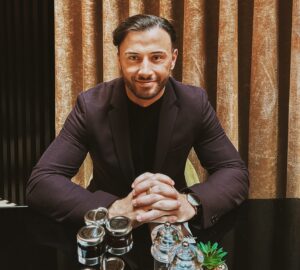 Zander Murray is a former footballer.
Zander Murray is a former footballer.
The Scottish striker, who has scored over 100 goals, came out as gay publicly in September 2022 and is passionate about using his voice to empower and support the LGBTQ+ community. He is a Stonewall Sport Champion, an Ambassador with the TIE Campaign and works with LEAP Sports and Football v Homophobia Scotland. He regularly speaks at conferences and at professional football academies on promoting inclusivity in the game, sharing his personal journey.
What have been the benefits for you of being your authentic self in football?
Not living a double life! It's surprised me, the reach my story has got to. I really underestimated the power of visibility. It's amazing how my life has transformed - I thought I was alone but that is definitely not the case! Hopefully I'm another pillar of this great and growing community.
Why are cross-industry network groups valuable?
It's integral to connect the dots and gain a perspective from different areas/sectors within our great sport. It's educational as it is informative, and also it's just great to connect and share views with people who have your best interests at heart. I've already learned and gained so much, and no doubt this will further continue. We all want the same things, and for football to be a safe place for all.
Who are the LGBTQ+ people in football who inspire you and why?
Thomas Beattie, Matt Morton, Anton Hysen, Justin Fashanu, Jake Daniels, Josh Cavallo, Robbie Rogers, Leah Williamson, Beth Mead, Christie Murray... and in particular, Lloyd Wilson, as for me this was the last push I needed within the Scottish men's football game, with Lloyd being an out gay referee in the Senior leagues.
As for the other names I've listed, seeing these people thriving within our sport is just so inspiring. With Josh coming out in our game in late 2021, and then Jake and Lloyd in 2022, this gave me great courage to follow suit!
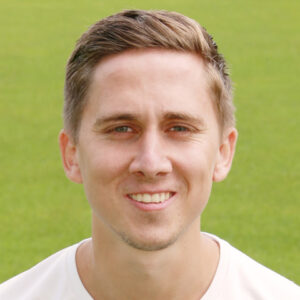 Matt Neil is a current Recruitment Analyst at Salford City in League Two. Since he started working in professional football in 2012, he has also held roles as the Lead First Team Analyst at Plymouth Argyle and Rotherham United.
Matt Neil is a current Recruitment Analyst at Salford City in League Two. Since he started working in professional football in 2012, he has also held roles as the Lead First Team Analyst at Plymouth Argyle and Rotherham United.
What have been the benefits for you of being your authentic self in football?
Being able to go about my job freely, knowing that it's OK to be who you are in football. There was always a worry that wasn't achievable in this industry and removing that stigma has helped me both professionally and outside of work.
Hopefully with more visibility from others as well, this can continue and help future generations to feel more comfortable working within the game.
How has connecting with other LGBTQ+ people in football helped you personally and professionally?
It’s been good to see that there are other people in a similar position to me out there. To be able to have certain conversations and understand things from people in different roles has opened my eyes to other challenges that people face.
I've also been able to speak to those who have been in similar positions to me before or that they're currently facing - they can understand what it's like in a way that other people can't.
What made you want to be a part of the Collective?
Hopefully one day this won’t be needed and the work that is being done today will make sure future generations can live and work freely in all industries, not just football.
But if this can help just one person working in football feel comfortable who didn’t feel they would be before, then everyone involved can take a massive amount of pride in being able to do that.
Follow Matt on Twitter.
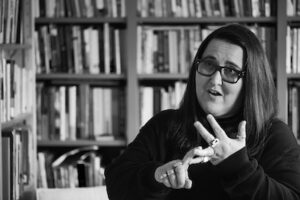 Chris Paouros is a lifelong Spurs fan and anti-discrimination campaigner who believes football can be a positive force for social and cultural transformation. She is Co-Chair and Co-Founder of Proud Lilywhites - the official Tottenham Hotspur LGBTQ+ Supporters Association - and co-founder of Pride in Football, the alliance of LGBTQ+ football fan groups in the UK; Vice-Chair of Kick It Out; Vice-Chair at the FSA; Supporter Representative on FA Council; and Chair of the Tottenham Hotspur Fan Advisory Board.
Chris Paouros is a lifelong Spurs fan and anti-discrimination campaigner who believes football can be a positive force for social and cultural transformation. She is Co-Chair and Co-Founder of Proud Lilywhites - the official Tottenham Hotspur LGBTQ+ Supporters Association - and co-founder of Pride in Football, the alliance of LGBTQ+ football fan groups in the UK; Vice-Chair of Kick It Out; Vice-Chair at the FSA; Supporter Representative on FA Council; and Chair of the Tottenham Hotspur Fan Advisory Board.
What made you want to be a part of the Collective?
This Collective is important as it’s easy to think there are no LGBTQ+ people getting on with their work in football. Anything we can do, collectively, to make it more inclusive for others to be themselves is crucial; as is using our collective voice for good in football.
Why would you recommend joining the Collective?
I couldn’t recommend joining the Collective enough - having people alongside you who understand the industry, but also what it’s like to navigate it as a Queer person is crucial; both to delivering our work in the best way possible, but also being our best selves. There’s nothing like being in something together.
Follow Chris on Twitter.
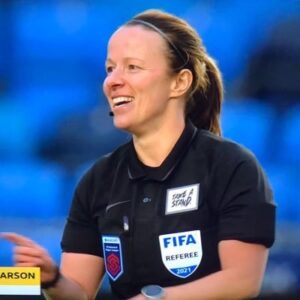 Stacey Pearson is a FIFA and Barclays FAWSL referee. She is also an FA referee tutor, FA CORE (centre of refereeing excellence) coach and referee observer. She has been refereeing since 2012, having qualified whilst also playing for Yeovil Town Ladies. She decided to retire from playing in 2015 to focus on my refereeing career - and hasn’t looked back since.
Stacey Pearson is a FIFA and Barclays FAWSL referee. She is also an FA referee tutor, FA CORE (centre of refereeing excellence) coach and referee observer. She has been refereeing since 2012, having qualified whilst also playing for Yeovil Town Ladies. She decided to retire from playing in 2015 to focus on my refereeing career - and hasn’t looked back since.
How has connecting with other LGBTQ+ people in football helped you personally and professionally?
Connecting with other LGBTQ+ people has given me the confidence to help fight for change. It has opened doors to new experiences and enabled me to collaborate with some brilliant people who are doing amazing things to help combat discrimination in football.
What made you want to be a part of the Collective?
I wanted to give a different perspective as a referee. I feel really passionately about encouraging people to be their authentic self and not be afraid of what people think of them. I also want to help improve the experiences of the LGBTQ+ community in football and help educate more allies.
If someone working in football who's LGBTQ+ or an active ally asked you about this network, why would you recommend they join?
This is a group of amazing people all working towards the same goal. The knowledge, passion and work ethic is inspiring. Joining would open new professional networks and allow you to use your voice to help make a difference.
Follow Stacey on Twitter and Instagram, and read more from her on the Collective in this article on Sports Media LGBT+.
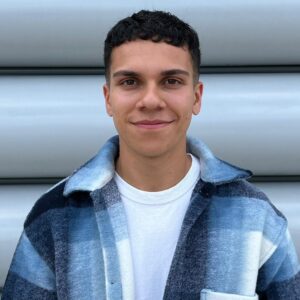 Sam Picton works as Partnerships Operations Executive at Manchester City FC.
Sam Picton works as Partnerships Operations Executive at Manchester City FC.
An advocate for inclusion in sport, he is also part of the Athletics Pride Network's media team, having competed in the sport for almost 10 years.
What have been the benefits for you of being your authentic self in football?
Growing up, I always shied away from football because I didn't feel like it was a space where I could be myself. Luckily, I had amazing people around me, particularly my family, who never pushed me into it even though they have always been massive football fans, and I've been able to come to it in my own time. It feels amazing to be in this space now that I'm open about my sexuality, and I wish I could go back and tell 15-year-old me what I'm doing now - I don't think he would believe me!
Who are the LGBTQ+ people in football who inspire you and why?
There are so many LGBTQ+ changemakers in football who are driving us towards a more inclusive game. I am so honoured to now be part of the Collective and can't wait to get to know everybody involved. In particular, Chris Paouros inspires me - I actually interviewed Chris for my dissertation about English football culture and racism before I started working in football, so to work alongside her now is a privilege and feels very full circle.
What made you want to be a part of the Collective?
I wanted to be part of the Collective because I believe in the importance of community, not just as an LGBTQ+ person, but specifically as a member of the community working in sport. We have to work together, LGBTQ+ people and allies, if we want to create genuine change in football, and I’m grateful to now be part of a group of like-minded people who share the same goal.
Follow Sam on Twitter and read his Pride 2023 blog for Kick It Out.
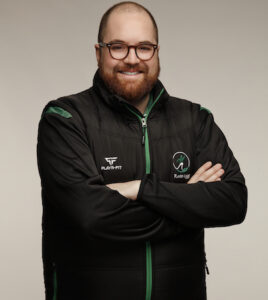 Hugo Scheckter started The Player Care Group after leaving West Ham United FC, where he was Head of Player Care from 2018 to the end of 2020. He was brought in by the Hammers to create the Player Care department from scratch, inheriting a difficult situation and turning it into a smoothly functioning department with an effective staff who possessed complementary skills.
Hugo Scheckter started The Player Care Group after leaving West Ham United FC, where he was Head of Player Care from 2018 to the end of 2020. He was brought in by the Hammers to create the Player Care department from scratch, inheriting a difficult situation and turning it into a smoothly functioning department with an effective staff who possessed complementary skills.
Prior to that, Hugo was at Southampton FC as their first Player/Team Liaison Officer, setting up their Player Care offering and helping to make Southampton FC a springboard for some of the world’s best footballing talent. In December 2022, he was appointed Interim Head of Player Care & Welfare at Brentford FC, and now acts as a Football Consultant for the Bees and also Newcastle United FC. He was also previously the 2nd XI Manager of Stonewall FC. He is a trustee of Football Beyond Borders.
What have been the benefits for you of being your authentic self in football?
For me, it's been really valuable, having to try to build relationships with players, if I can share my life with them, because they then often share their life better with me.
I felt much more confident and relaxed when I was able to come out and having seen the difference for me between before and after, it's definitely been much better.
What changes are you seeing in the football industry that are making it more inclusive?
To be honest, I've never really felt that it isn't inclusive. I've always felt a good level of respect from everybody that I've worked with - players, managers, CEOs - so I've never really felt any problems.
I think society in general is changing and I think that's allowing football to change. There's probably still some work to be done but overall, I've never felt anything too negative.
What made you want to be a part of the Collective?
I thought it was really important for us to have a unified voice, but be able to share differences of opinion and different experiences.
I've really not experienced much on the fan side but I have good experiences with the team and player side so I want to be able to lend my voice and help drive this important movement forward.
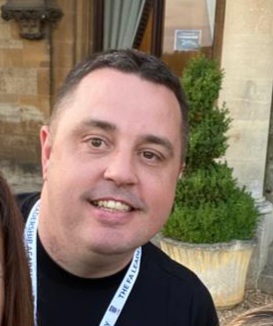 Ash Slaughter is the Platform for Football (PFF) Lead in Grassroots at the Football Association, and Co-Chair of the FA Pride Network. He started working in football in 2002 at Sussex County FA. Having spent nearly 16 years there, he joined the FA in February 2018 in the Technology Adoption Team. His roles previously have been in the Governance and Services side of the game, working with clubs, leagues, players, and volunteers. He is also a referee and qualified referee tutor.
Ash Slaughter is the Platform for Football (PFF) Lead in Grassroots at the Football Association, and Co-Chair of the FA Pride Network. He started working in football in 2002 at Sussex County FA. Having spent nearly 16 years there, he joined the FA in February 2018 in the Technology Adoption Team. His roles previously have been in the Governance and Services side of the game, working with clubs, leagues, players, and volunteers. He is also a referee and qualified referee tutor.
What have been the benefits for you of being your authentic self in football?
I have found from the outset, being my authentic self has allowed me to express myself to the best of my ability. Whether this is in the workplace, or one of my volunteer roles within grassroots football, or indeed my refereeing. It builds confidence and comfort in all aspects, as well as encouraging colleagues to treat you as your true self.
What changes are you seeing in the football industry that are making it more inclusive?
We are seeing more visibility and discussion, which for me helps to share with everyone, that football is inclusive, and you are welcome. Long gone are the days where you could not be yourself, now is the time to join in and be you! Whilst we have work to do, more and more we are seeing strides forward with clubs and associations taking inclusion seriously.
Why are cross-industry network groups valuable?
It is vital we can firstly join as one, as cross-industry groups can prove to be a great source of support to each other. Moreover, we can share learnings and experiences, which can help us in the challenges we face. I really do hope, this collective can be a place for everyone and bring together the amazing people we have across the game in all different roles. We can show the huge wealth of experience, talent and support on offer in football.
How has connecting with other LGBTQ+ people in football helped you personally and professionally?
Firstly, I have made some incredible friends, which is great and brings a sense of belonging to many, I am sure. We are fortunate to have so many awesome role models in football from the LGBTQ+ community, being able to connect with them professionally, helps to ensure we are doing all we can to support. Furthermore, what we can learn from each other, via lived experience or knowledge will help us to empower a movement of acceptance and inclusion for everyone, allowing them to be their authentic selves in all environments within the game.
Who are the LGBTQ+ people in football who inspire you and why?
There are many who have inspired me, but a key person to reference and the reason why is, Lou Englefield. Lou is an unbelievably incredible person, who makes a difference across the game, in so many roles. Whether the work with Pride Sports or via Football v Homophobia to mention a couple, I always gain inspiration from Lou and delighted to have met Lou through football. I believe the work Lou does, makes a huge impact across the game from pro game academies to grassroots football via the campaigns we see. I could write about so many others, many who are or will be part of this collective, but I am limited from writing a novel 🙂
What made you want to be a part of the Collective?
As soon as I heard it was being discussed, I recall speaking to Funke Awoderu at the FA saying I would love to be involved. Whilst I have been fortunate and had a very positive experience, I am very aware many others have not. If we can create this collective to be a place for everyone to be their true them, grow in confidence, build strength, and empower change, why wouldn’t we want to be involved. I truly believe this will be a game changer for many and is a massive stride forward for LGBTQ+ people within the game.
If someone working in football who's LGBTQ+ or an active ally asked you about this network, why would you recommend they join?
For many of the reasons above, I would encourage them to join us. You will meet some inspirational people, opportunity to meet likeminded people, connect with others who you can share experiences with and gain support, to name a few. In addition, it can open conversations, access to potential for career opportunities and have representation.
Read more from Ash in this article on the Sussex FA website from June 2021.
 James Swanson is a senior sports marketing executive. He recently joined World Rugby from Arsenal.
James Swanson is a senior sports marketing executive. He recently joined World Rugby from Arsenal.
He was previously at Harlequins, where he launched rugby union's first LGBTQ+ Pride Game and LGBTQ+ Supporters' Association, Quins Pride, and also held roles in the US sports & entertainment market in the NHL (Tampa Bay Lightning) and music (Amalie Arena).
James is also the co-chair of Pride in Tennis, the LGBTQ+ network for tennis in Great Britain, and sits on the D&I committees for Leaders in Sport, England Hockey, and Basketball England.
What have been the benefits for you of being your authentic self in football?
I made an active choice to be very authentic in how I express myself when I first joined the club and I was fortunate that there was LGBTQ+ representation on the office floor I sat on, so I was quickly able to form a safe, queer space to engage with early on in my Arsenal journey.
This also gave me the opportunity to re-launch the internal LGBTQ+ staff forum, which as a group has been able to help shape and influence many of the club's externally facing LGBTQ+ work.
Why are cross-industry network groups valuable?
Since returning to the UK, I've found these network groups to be invaluable. They've helped me form strong friendships, launch wider D&I initiatives, and sense-check new ideas.
From providing introductions to significant LGBTQ+ people in the sports landscape to invitations to educational inclusion events, these networks have been one of the key foundations in developing my D&I acumen.
How has connecting with other LGBTQ+ people in football helped you personally and professionally?
From a professional lens, the connections I've made with other LGBTQ+ people in the football space has helped me understand best practices across the game and better understand the layers of a sport I am still rather inexperienced in. These connections have also helped me elevate many of our wider LGBTQ+ inclusion initiatives.
From more of a personal perspective, I've been able to share my experiences in football (both positive and negative) with people who have their own lived experience in this space, and are in an equipped position to offer helpful support and advice.
Follow James on Twitter.
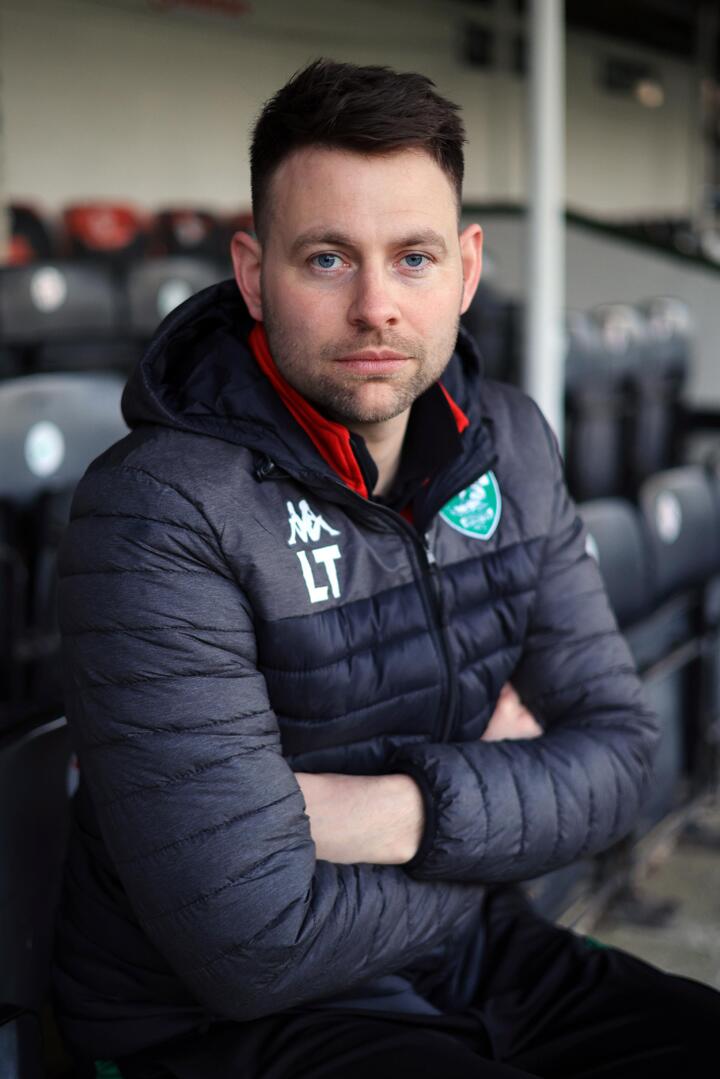 Luke Tuffs is the manager of Ashford Town (Middlesex) FC, beginning his second spell in charge of the Isthmian League South Central Division club in May 2023. A UEFA A Licence student, he was previously in charge of Leatherhead FC and Knaphill FC. Prior to those appointments, he was the first-team coach and U18 manager of Hartley Wintney FC.
Luke Tuffs is the manager of Ashford Town (Middlesex) FC, beginning his second spell in charge of the Isthmian League South Central Division club in May 2023. A UEFA A Licence student, he was previously in charge of Leatherhead FC and Knaphill FC. Prior to those appointments, he was the first-team coach and U18 manager of Hartley Wintney FC.
What have been the benefits for you of being your authentic self in football?
I think it's brought the best out of me, both in and out of football. If I hadn't come out, I don't think I'd be where I am now and I don't think I'd have had the success that I've had - and obviously I don't think I'd have my wonderful fiance Rhys either.
I think that if you're not out and you're having to hide who you are, you're constantly worried about getting found out, of saying the wrong thing. You're just constantly having to make up lies effectively about who you're going out with, who you like, where you're going, who you're going with. Constantly second guessing whether you're saying the right thing or not, it wears you out.
That amount of energy is going to take it out of you and there's no way that you can achieve like that. So the benefit of being my authentic self is that it's allowed me to be myself and be successful in this game I love.
How has connecting with other LGBTQ+ people in football helped you personally and professionally?
Personally, it’s been massive for me. Growing up, there was no one else that was like us in that way, and there were no other LGBTQ+ people to look up to. So having people that have got football and other things in common with me and that also just so happen to be LGBTQ+ as well, it’s massive.
It’s great being able to be around people that have got similar experiences and have walked the same path, so to speak, and are also able to carve out a career. It gives me a lot of confidence and that’s really important to me.
It’s also been brilliant for networking. I’ve met people that I quite simply wouldn’t have met otherwise. I’ve learned lots off them as well and it’s given me opportunities that I probably otherwise wouldn’t have had.
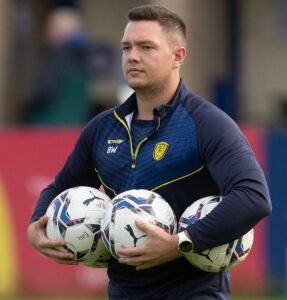 Ben Watkiss is a strength & conditioning coach with over five years’ experience in professional football.
Ben Watkiss is a strength & conditioning coach with over five years’ experience in professional football.
He has worked domestically with Birmingham City, Burton Albion and most recently Solihull Moors, as well as abroad with Kalyani Bharat FC (India) and the Bangladesh national team.
In August 2023, he was appointed Lead Sports Scientist at Ayr United.
What have been the benefits for you of being your authentic self in football?
Before I felt able to be open about my sexuality, I was often more reserved around others due to fear of “outing” myself through my mannerisms or something I would say. By being open and authentic, I feel more comfortable being myself in social settings and this has allowed me to build stronger relationships, especially within football where previously I was most reserved. Subsequently, this has improved my ability to coach players and work with the management team, as well as making my day-to-day work life more enjoyable.
What changes are you seeing in the football industry that are making it more inclusive?
I believe that society overall is much more accepting nowadays and football is reflective of that. Initiatives such as the Rainbow Laces campaign have publicly raised the issue of homophobia within football in a way that triggers conversations and makes it easy for people to show allyship and acceptance. People are also more aware of the language they use now and while homophobic slurs may previously have been accepted as banter within dressing rooms, I believe players are now more willing to call their teammates out for it.
Who are the LGBTQ+ people in football who inspire you and why?
Anybody who is able to be open about their sexuality within football inspires me as it can be so difficult to be open in a sport in which so few are comfortable enough to do so. Josh Cavallo and Jake Daniels are obviously trailblazers and I have massive admiration for their bravery in being the only current openly gay professional players, especially at such young ages. I am also inspired by other football support staff, such as Dan Hutchings and Matt Neil who both came out recently, as just from being visible they will play important roles in the continued fight for inclusivity.
What made you want to be a part of the Collective?
I’m a big believer that if you’re “out” in football, you have a role to play in helping to make football a more inclusive and diverse place. I want to use my position within football to contribute towards change and I feel that being a part of the Collective and sharing ideas and conversation with like-minded professionals maximises my ability to do so.
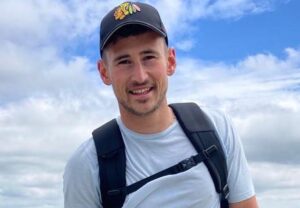 Jake Williamson has played football from a grassroots level up to being in and around professional environments.
Jake Williamson has played football from a grassroots level up to being in and around professional environments.
He is now a multi-sports athlete who wants to help make the game more inclusive, such as through his role as a Sport Champion with the charity Stonewall. After coming out and experiencing first-hand how difficult that process is, he is now looking to assist others going through a similar journey.
What have been the benefits for you of being your authentic self in football?
The biggest things are being able, through visibility, to impact people inside and outside of the LGBTQ+ community, and to have good conversations with people. I've played football for 20 years and I've yet to meet an active out gay man across both the coaching and playing sides of the game, so for me and others to be visible and talk openly about that part of who we are is huge for people who might come across us.
What changes are you seeing in the football industry that are making it more inclusive?
I would say those conversations and the repercussions they have are the biggest part, at this stage. Of course, more can be done structurally but the foundations are now there. For me, it's about players in the men's game who are gay or bi slowly becoming comfortable to come out if they want to, and people discussing that enough for it - gradually - to not be such a major process.
Why are cross-industry network groups valuable?
Again, it comes down to the topic of discussions and conversations. Even within the LGBTQ+ community, there are differences, from terminology to experiences and many other areas in between. Talking about our journeys and creating safe spaces for those conversations to be had is important. Some networks in sport are going to be further along in terms of their progression so being able to learn and share information about processes and steps is a great way for our Collective to grow.
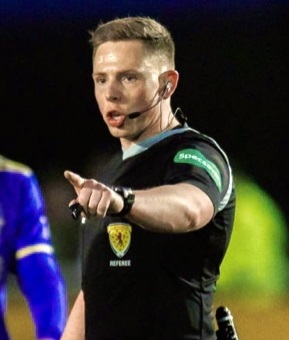 Lloyd Wilson is a Senior Listed category 1 referee operating across the Scottish Premier Football Leagues. He came out as gay publicly in June 2022 and is keen to use his experience as a professional in education, social work and sport to promote the visibility of the LGBTQ+ community. He has recently been appointed as an Ambassador for the Justin Fashanu Foundation and as a Stonewall Sport Champion.
Lloyd Wilson is a Senior Listed category 1 referee operating across the Scottish Premier Football Leagues. He came out as gay publicly in June 2022 and is keen to use his experience as a professional in education, social work and sport to promote the visibility of the LGBTQ+ community. He has recently been appointed as an Ambassador for the Justin Fashanu Foundation and as a Stonewall Sport Champion.
What have been the benefits for you of being your authentic self in football?
Since being my true self, I've felt more confident, although some would argue I did not need that! All joking aside though, I have felt more confident in being able to talk about my personal life. It's been great being able to talk about the good things I get up to with my family, friends, and all the wonderful things that include my partner Hamish. Before, I would have brushed off what I was getting up to, in fear that people would find out I was gay. Looking back, I cannot believe the pain I put myself through.
What changes are you seeing in the football industry that are making it more inclusive?
I feel since sharing my story, the subject of being gay in football has been getting spoken about so much. I’m not sure if that is just coincidence. I believe people playing, watching and working in the game are starting to recognise that the lack of out LGBT+ people in football is actually quite sad. On the whole, I think people are trying hard to make it so that being LGBT+ in football is "normal". So-called anti-gay 'banter' is being called out more now, I believe. That's been my experience.
Why are cross-industry network groups valuable?
So many sports have nailed it - I think women's football has done an amazing job in making football for everyone, not just straight or LGBT+ people. Other sports have also created much more inclusive environments. Men's football has a long way to go yet!
Follow Lloyd on Instagram.
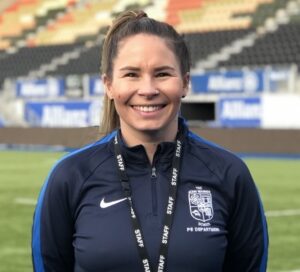 Hayley Wood-Thompson is a P.E. teacher, footballer and coach based in Hertfordshire who has dedicated her career to developing opportunities for girls in football and ensuring that school and sport is a safe space for everyone in the LGBTQ+ community. She is the captain of Cheshunt FC Women, a member of the Hertfordshire Schools FA Executive Committee and won the Football v Homophobia Hero Award in 2022.
Hayley Wood-Thompson is a P.E. teacher, footballer and coach based in Hertfordshire who has dedicated her career to developing opportunities for girls in football and ensuring that school and sport is a safe space for everyone in the LGBTQ+ community. She is the captain of Cheshunt FC Women, a member of the Hertfordshire Schools FA Executive Committee and won the Football v Homophobia Hero Award in 2022.
What have been the benefits for you of being your authentic self in football?
Being my authentic self in school and football has benefitted me and others greatly. It has helped others feel safe in school, have someone to talk to or reach out to for support, especially if they do not have this support at home. In football, it has allowed conversations to happen, and an opportunity for other players to feel safe and accepted.
What changes are you seeing in the football industry that are making it more inclusive?
I have noticed there is more of an open conversation in the football industry surrounding pride and LGBTQ+. Lots of clubs now have LGBTQ+ fan groups, clubs are outwardly celebrating pride and wearing rainbow laces and finally we have had a professional player feel safe enough to come out in the men's game, which shows progress and make it feel more inclusive.
In the women's game, the attitudes are far more open and accepting. Many of the professional players are out and proud and celebrated by fans and it feels really inclusive, especially with the success of the Lionesses in summer 2022. People are more likely to talk about the players' abilities and not their sexuality, which is really promising.
Who are the LGBTQ+ people in football who inspire you and why?
I am really inspired by the openness and bravery of Alex Scott and Leah Williamson. Both women are excellent role models and have both opened up about their sexuality and stood up and spoken out about a number of LGBTQ+ issues surrounding inclusion in the game.
Alex's wearing of the 'One Love' armband during the Qatar World Cup coverage was one of the stand-out moments from the tournament, and it was both brave and brilliant to stand up against FIFA. This moment will be forever celebrated by the entire LGBTQ+ community.
Follow Hayley on Bluesky. Learn more about her in this Sports Media LGBT+ article and accompanying FvH Podcast episode.
